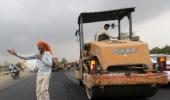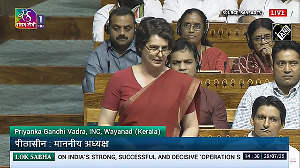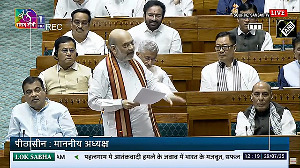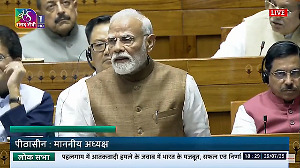The World Bank on Sunday said the coronavirus outbreak has severely disrupted the Indian economy, magnifying the pre-existing risks to its outlook.

In its ‘South Asia Economic Update: Impact of Covid-19’, the World Bank estimated the Indian economy to decelerate to 5 per cent in 2020 and projected a sharp growth deceleration in fiscal 2021 to 2.8 per cent in a baseline scenario.
The Covid-19 outbreak came at a time when India's economy was already slowing due to persistent financial sector weaknesses, the report said.
To contain the pandemic, the government imposed a ‘lockdown' with restrictions on mobility of goods and people.
“The resulting domestic supply and demand disruptions (on the back of weak external demand) are expected to result in a sharp growth deceleration in FY21 to 2.8 percent in a baseline scenario (an estimate subject to wide confidence intervals),” the report said, adding that the services sector will be particularly impacted.
A revival in domestic investment is likely to be delayed given the enhanced risk aversion on a global scale, and renewed concerns about financial sector resilience.
“Growth is expected to rebound to 5.0 per cent in fiscal 2022 as the impact of Covid-19 dissipates, and fiscal and monetary policy support pays off with a lag,” the report said.
In a conference call with reporters, World Bank Chief Economist for South Asia Hans Timmer said India's “outlook is not good.”
And if the domestic lockdown is prolonged, then the economic result can be much worse than what the World Bank has in its baseline range of forecasts.
Among the steps that India can take to address this challenge, Timmer said the first step is to focus on mitigating the spread of the disease, and to make sure that everybody has food.
“Then, it is very important to prepare for a rebound and that means there should be a focus on temporary jobs programmes, especially at the local levels. Those initiatives should be supported. And it is important to prevent bankruptcies, especially of a small and medium-sized enterprise,” Timmer said in response to a question.
“In the longer run, this is really an opportunity to bring the Indian economy on sustainable path not just fiscally, but also socially,” he said.
The World Bank is working with India to mitigate the challenge posed by Covid-19. It has approved USD1 billion to India, of which the first tranche has already been released to deal with the emergency in the healthcare sector.
The first tranche aims at delivering civilian diagnostic equipment, put in place additional capacity to deal with testing, and make testing available that benefits the entire population, said World Bank Vice President for South Asia Hartwig Schafer.
The World Bank is also working with India on two additional operations, which is anticipated to be ready in a matter of weeks.
These include employment, banking and micro, small and medium enterprise sector.
In its report, the World Bank said that the Covid-19 outbreak has magnified pre-existing risks to India's economic outlook.
The government is undertaking measures to contain the health and economic fallout, and the RBI has begun providing calibrated support in the form of policy rate cuts and regulatory forbearance.
“Given significant uncertainties, there is a wide confidence interval around the baseline estimate. If a large-scale domestic contagion scenario is avoided, early policy measures payoff, and restrictions to the mobility of goods and people can be lifted swiftly, an upside scenario could materialise in FY21, with growth around four per cent,” it said.
“However, if domestic contagion is not contained, and the nationwide shutdown is extended, growth projections could be revised downwards to 1.5 per cent, and fiscal slippages would be larger,” the World Bank said.










